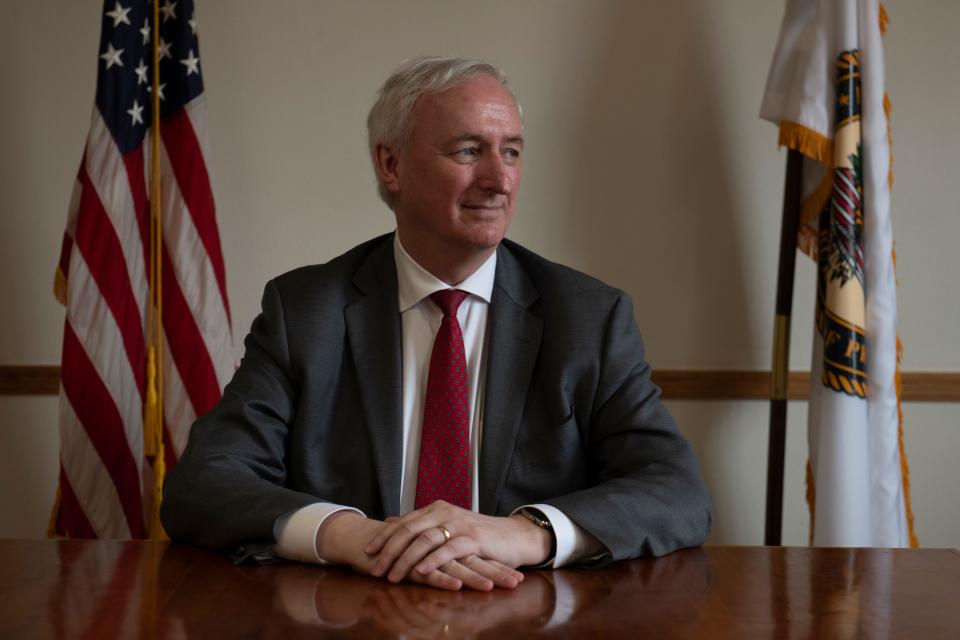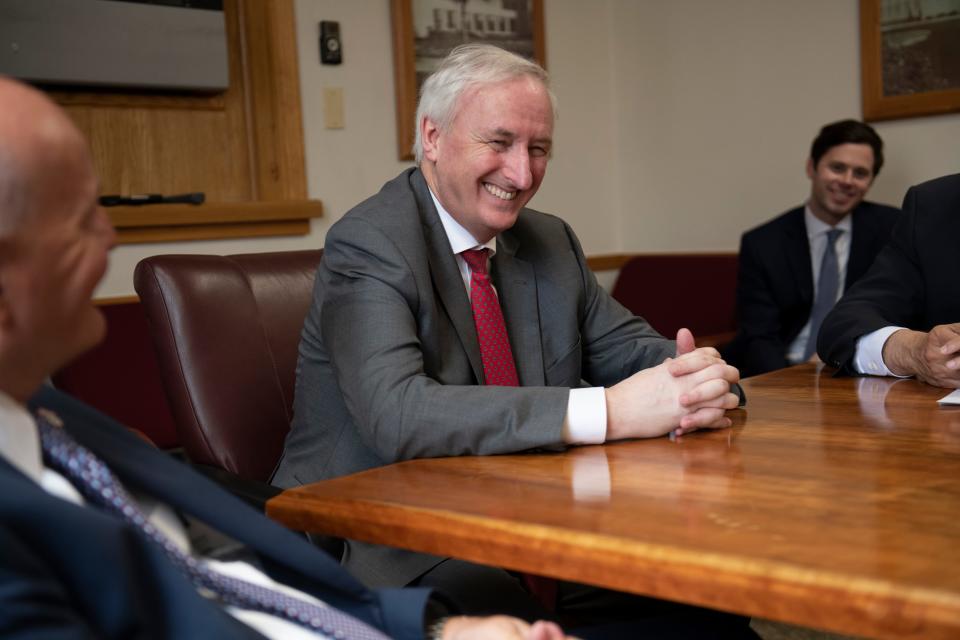Deputy Attorney General Jeffrey Rosen not yet briefed on DOJ probe into origins of Russia probe
ENGLEWOOD, Colorado – Deputy Attorney General Jeffrey Rosen said that he has yet to be briefed on the potentially volatile inquiry into possible surveillance abuses by federal authorities in the early days of the Russia investigation.
Rosen, in an interview with USA TODAY this week, said that he was unaware of the investigation’s status and did not know whether it has since morphed into a criminal inquiry.
“I don’t know the answer to that. I’d have to check and get back to you. I hear it described as an inquiry. I don’t want to say something that won’t be accurate. So let me defer on that one. “
The Justice Department later declined to elaborate. But Rosen’s deference on such a high-profile matter underscored the extreme close-hold on an inquiry launched by Attorney General William Barr and now managed by Connecticut U.S. Attorney John Durham.
It also highlights how Rosen, more than a month following his confirmation, has so far assumed a role largely out of the public eye in a stark departure from his predecessor, Rod Rosenstein, whose rocky two-year tenure was defined by his management of the Russia investigation and former Justice special counsel Robert Mueller.

John Durham: Attorney general taps top Connecticut federal prosecutor for review of Trump-Russia inquiry
"It (the surveillance inquiry) started before I arrived," Rosen said, adding that he was "not currently" being briefed on it. "I had some generalized awareness, but I'm not meeting regularly with Mr. Durham."
In April, Barr startled some lawmakers when he disclosed that he was reviewing the FBI's use of surveillance involving associates of President Donald Trump during the presidential campaign as authorities sought to understand Russia's interference efforts. At the time, Barr said he did not know whether officials had done anything wrong, though the review's disclosure was instantly cheered by some Republicans and Trump who has long disparaged Mueller's work as a "witch hunt."
"Spying on a campaign is a big deal," Barr told a Senate panel then. "I think spying did occur. The question is whether it was adequately predicated."
In May, the attorney general injected new urgency into that review when he tapped Durham, a long-time federal prosecutor, to review the "genesis and the conduct" of the FBI's investigation into possible ties between the Trump campaign and Russia.
Durham's appointment came just three days before Rosen's confirmation as second-in-command at Justice.
The inquiry is proceeding, as Justice's inspector general is conducting its own review of how federal authorities obtained a warrant in 2016 to monitor former Trump foreign policy adviser Carter Page and his possible links to Russia. The results of that investigation are expected to be disclosed soon.
While not briefed on the Barr-Durham inquiry, Rosen nevertheless characterized it as "serious."
"I'm not sealed out," the deputy attorney general said, explaining that the attorney general had already taken on the coordinating role with Durham.

Rosen, 61, arrived at the Justice as a largely unknown player, having served in the top ranks of the Transportation Department – but never at the sprawling Justice Department.
His lack of Justice experience drew criticism from some Democrats who have expressed concern for the department's independence from the White House in the aftermath of the Mueller investigation.
"At this critical moment, we need a deputy attorney general who knows the Justice Department, who has experience in criminal investigations and prosecutions, and who is committed to the department’s role of enforcing the law independently," Sen. Dick Durbin, D-Ill., said after voting against Rosen's confirmation.
Acknowledging his role as "the new guy," Rosen said the learning curve has presented few problems so far.
"You know it’s always risky to assume that you know what you don’t know," the deputy attorney general said. "So, I’m sure there are things I don’t know. But it’s gone extremely well from my vantage point. I think some of the concerns that were raised about that (lack of experience) didn’t account for the fact that the Justice Department, in some ways, is like a big law firm. I spent a lot of time at a big law firm; there (are) tremendous resources available. And so the things that I need to get up to speed on, I have like the foremost experts in the world available to me to brief me on them."
In his first month, Rosen has sought a fuller understanding of the opioid crisis in America and has taken a lead role in Justice's implementation of bipartisan criminal justice legislation aimed at easing sentences for non-violent drug offenders, reducing the federal prison population and assisting offenders' transition back into their communities.
Rosen said Justice is on schedule to deliver a critical tool to assess the needs and risks of future recidivism for federal prisoners. The program, required under the First Step Act, a sweeping measure intended to reduce the nation's prison population, is due by July 19.
On the same date, the federal Bureau of Prisons is set to recalculate the amount of so-called "good time" earned by federal offenders, an action that is expected to result in the release of 2,200 offenders to their home communities.

Barr: Attorney general says he will review government 'spying' on Trump campaign; 'I am concerned'
Rosen, who was touring the federal prison in Englewood, Colo., earlier this week in advance of the actions slated for later this month, said Justice was "pushing hard" to abide by the requirements of the new legislation.
Since the First Step Act was signed into law in December, Rosen said 1,093 drug offenders have been released from federal prisons as part of a provision that reconciled overly harsh sentences issued to crack cocaine offenders. Another 171 low-risk elderly inmates and 46 chronically-ill offenders also have been released under terms of the legislation.
"I’m putting my personal attention on that," Rosen said of the legislation. "The attorney general is, too."
Rosen's personal attention to a separate prison-related matter, however, captured the most public notice of his tenure so far.
Rosenstein: Deputy AG offers biting defense of Russia investigation, jabs Obama administration

In a letter to Manhattan District Attorney Cyrus Vance earlier this month, the deputy attorney general weighed in on the question of where former Trump campaign chairman Paul Manafort should be confined during his prosecution on state financial fraud charges.
Citing Manafort lawyers' concern for their client's "health and safety" if moved to a state prison, Rosen directly raised the issue with Vance, noting that that lawyers preferred that Manafort remain in federal custody where he is serving a 7.5-year sentence on a financial conviction. Such issues are generally not raised to the highest levels of the Justice Department.
Manafort: Reports: Manafort not headed to Rikers Island after DOJ intervened
Rosen dismissed the suggestion he was intervening on behalf of Manafort. He said he was merely attempting to resolve a question raised by federal prison officials.
"To me that seemed pretty benign," Rosen said. "Maybe…I have to adapt to a new environment, as someone who came from another department. But it didn’t seem like an extreme measure to me to ask the New York district attorney, 'What do you think we should do with this?'"
Going forward, Rosen said he expects to apply a simple rule of management.
"It’s not my job to do their jobs," he said of the department's more than 110,000 employees. "It’s to ensure that everyone is doing their job."
This article originally appeared on USA TODAY: Deputy Attorney General Jeffrey Rosen not yet briefed on DOJ probe into origins of Russia probe

